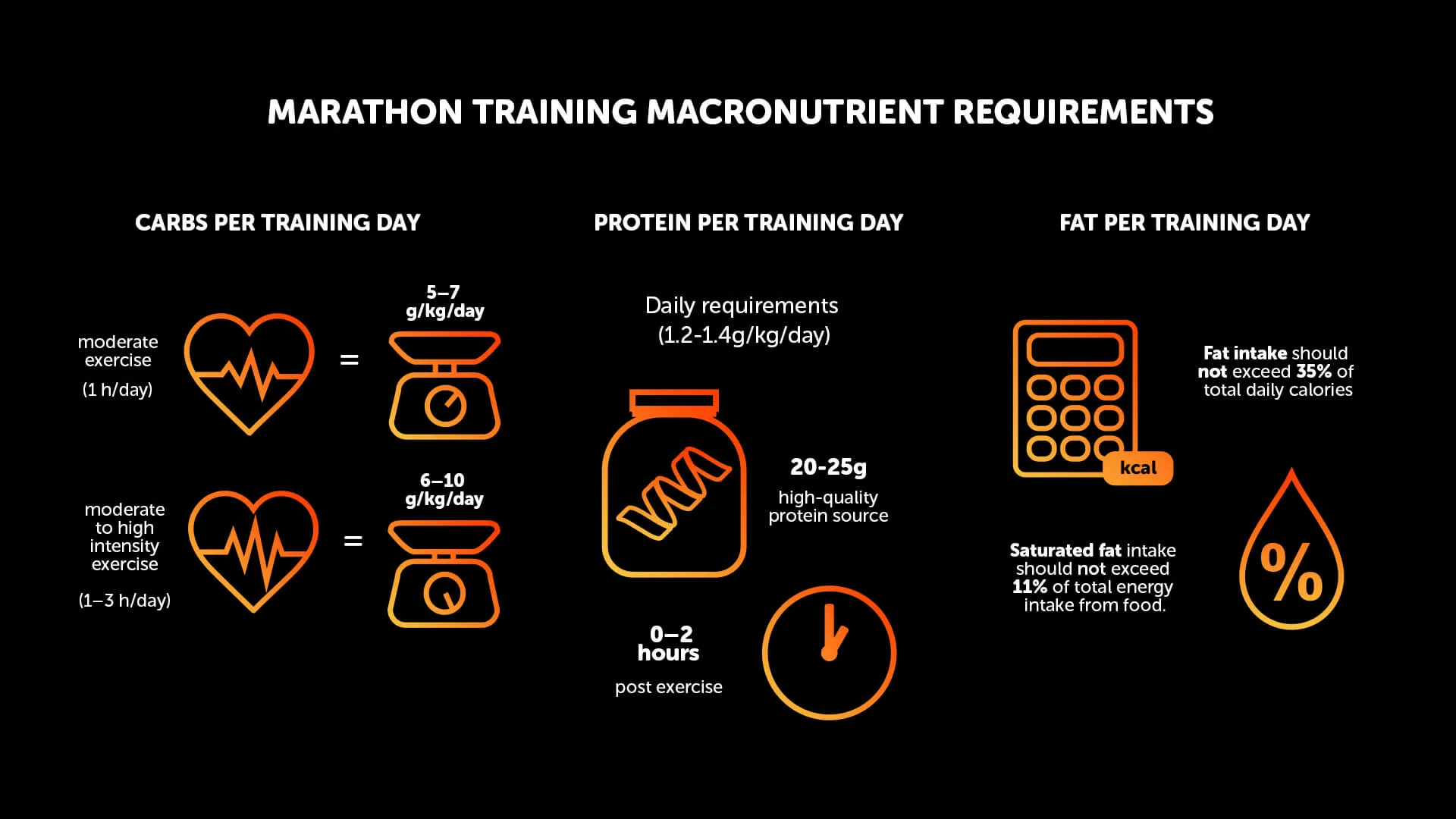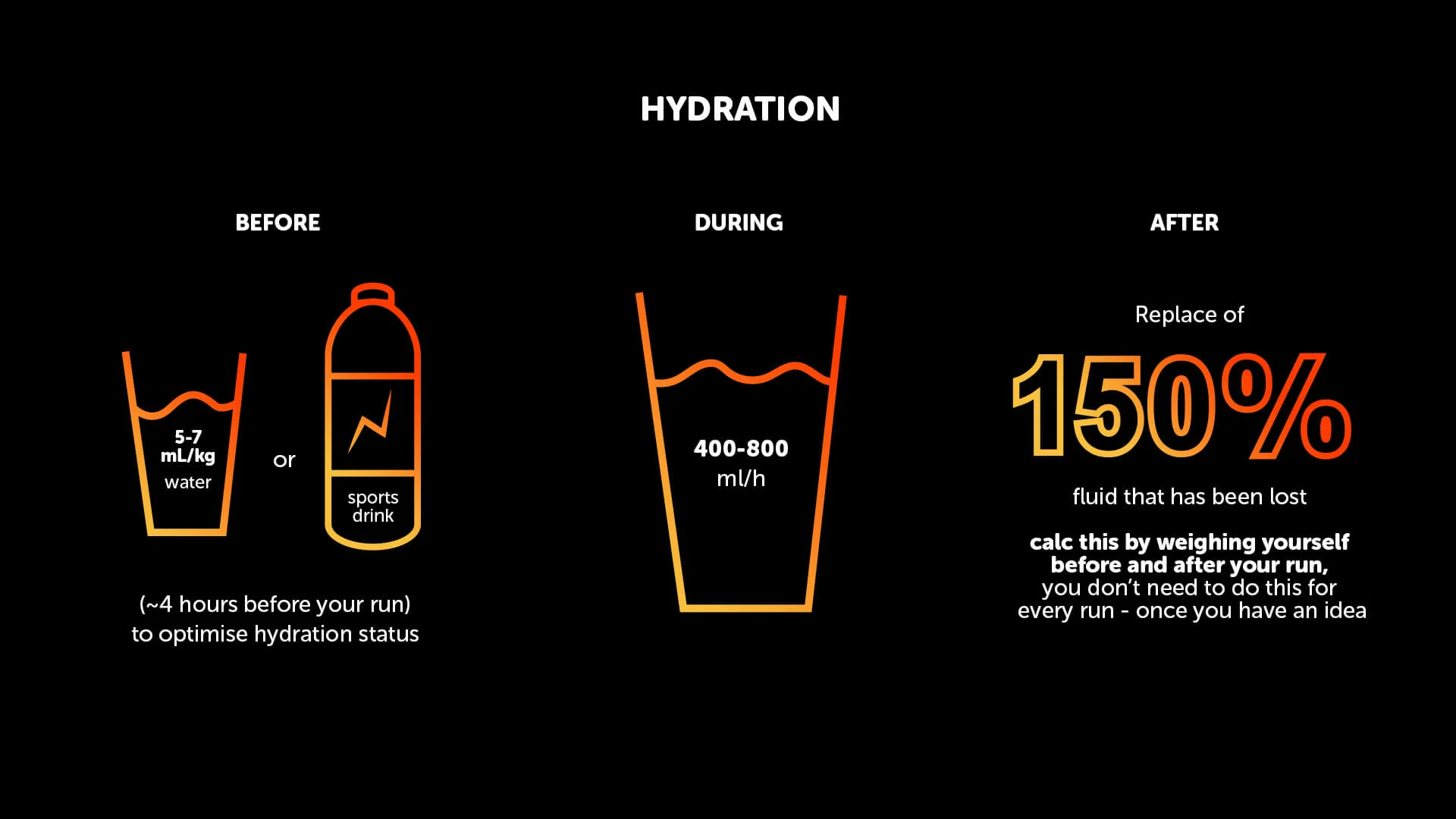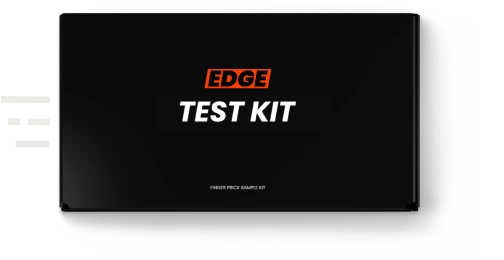
Running
Nutrition For Marathon Training
Are you taking on a 26.2 mile race this year? You’ve probably got the training plan sorted. But have you thought about your nutrition? Keep reading to find out how best to fuel your training in the build up to the race! Featuring expert advice and top tips from our long-distance running ambassadors.
5 mins read
Published on
October 16, 2023
Written by
EDGE
Share this article
GET YOUR MACRONUTRIENT REQUIREMENTS RIGHT
Your nutrition plan is actually more important than your training plan. If you don’t give your body the fuel that it needs, then it simply won’t be able to run. Just like a car without petrol. Now you are going to be running multiple times per week, with one of these being the ‘long run’, alongside completing other training sessions, and dealing with busy life schedules. This is going to require a lot of energy. Therefore, it’s particularly important that you are providing your body with enough food and nutrients it needs to support this. It is also vital you are getting enough sleep to allow your body to rest, rejuvenate and recover!
Every runner is unique and will require different energy requirements in relation to body size, training schedule, training intensity and training duration, alongside individual daily life schedules. However there are some general rules and guidelines that we can all use to make sure we are getting it right.
Carbohydrate
As runners (and any endurance sport really!) we all know that carbohydrates are key and our body’s main source of energy, which are stored in the body as glycogen[1]. The Academy of Nutrition and Dietetics (AND), Dietitians of Canada (DC), and the American College of Sports Medicine (ACSM) recommends that moderate exercise (1 h/day) requires 5–7 g/kg/day of carbohydrate, while moderate to high intensity exercise (1–3 h/day) requires 6–10 g/kg/day[2].
Hayley Carruthers (GB marathon runner): “Practice your fuelling strategy for race day. It is always better to have more fuel than not enough. Fuelling for your big sessions starts the day before in carbohydrate intake. Make sure you eat something within 20-30 minutes of every run and try to get into the habit of having a protein-based drink before your sleep to promote recovery.”
Protein
For endurance runners it is recommended to consume 1.2-1.4g/kg of protein per day to maintain muscle mass and be able to repair and recover. Following your run, you should consume 20-25g of a high-quality protein source in the first 0–2-hours after your run[2][3][4]. For the best results take in a ratio of 3-to-1 ratio of carbohydrates to protein. So for example 20-25g of protein with 60-75g carbohydrates[5].
If you eat more than 25g of protein it will not improve your recovery further. There is a limit on how much your body can process in one go[6]. It has also been reported that muscle protein synthesis (that’s your muscles recovering) can only be stimulated with protein intake being at least 3-5 hours apart[3]. Therefore spread out your protein intake throughout the day as approximately 0.3 g/kg every 3–5 hours to meet your daily protein requirements[3].
Fat
Why do we need fat? Fats are fundamental components of the cell membranes and play a vital role in signalling and transporting nerve function along with providing insulation and protection of the organs[7]. Endurance runners are encouraged to follow public health guidelines that state total fat intake should not exceed 35% of our total daily calories. Saturated fat intake should not exceed 11% of total energy intake from food, which is roughly 30g per day for men and 20g per day for women[14] Endurance runners should only consider limiting fat intake during pre-race and race day[3].

Lily Partridge (GB Marathon Runner): “Eat. A lot. You should be eating before and after all training runs as well as in between. Carbohydrates are a huge source of fuel as well as protein after your training. If you struggle to eat solid food straight after training, then try products like chocolate milk or find a protein shake product you like for liquid fuel. Also making sure you have a consistent sleep routine. For example: hot shower/bath, warm milky drink, phone down and read a book before you go to bed.”
How To Get Your Hydration Right
Pre-Run Hydration
Make sure you are hydrated before you start your run[8]. Aim to consume 5-7 mL/kg of water or a sports drink (~4 hours before your run) to optimise hydration status[9].
During Run Hydration
Drinking during exercise is to prevent excessive (>2% body weight loss from water deficit) dehydration and excessive changes in electrolyte balance which will negatively impact performance[8]. It has been found that if euhydration is maintained, gastrointestinal symptoms are less prevalent[10]. For you endurance runs aim for 400–800 mL/h[11]. However, it is important to test these things out, see how much you can take on board without issue.
Consider your sweat rates, sweat sodium content, intensity of exercise, body temperature, environment temperature, bodyweight, and kidney function[8]. This is especially important if you have previously experienced problems with cramp. Sodium ingestion during exercise is strongly recommended for athletes with high sweat rates and runs greater than 2 hours[2]. Following your run, it is vital to replace fluid with 150% of the fluid that has been lost[12]. You can work out how much this is by weighing yourself before and after your long run.

How does professional ultra runner and world record holder Carla Molinaro fuel her long runs?
On a typical long run day I eat:
Breakfast – oats with whole milk and berries or apples + tea
Run – taking on at least 60g/carb/hr when marathon training (more for ultra-training) this will typically be gels + electrolyte drink
Post run (asap) – smoothie with banana, berries, peanut butter, and protein powder
Lunch – 1hr post run potatoes and vegetables
Afternoon snack – toast with jam
Dinner- anything from risotto to pasta to fajitas
Before bed – coco pops with whole milk
Then about 10 cups of tea throughout the day!
Should I carb-load?
Carb-loading, is performance-enhancement strategy, most commonly used by endurance athletes before a competition or event[3]. Carb-loading involves increasing carbohydrate intake around 1-4 days before an endurance event. It has been shown that performance benefits from carb-loading are most likely to occur in events lasting longer than 90 minutes[13]. Therefore, endurance events such as the marathon would benefit from carb-loading.
How do I carb-load?
to start the carbohydrate loading process 1-4 days before your endurance event. For example, if your endurance event is on Sunday then it is recommended to start Wednesday to Friday. Renee McGregor recommends “eating little and often not necessarily increasing volume or overall energy but changing the composition of the diet so it’s higher in carbohydrate. For example, swapping porridge and nuts to porridge with banana and honey or choosing to snack on malt loaf instead of yoghurt.”
‘Pasta parties’ have become a common part of carb loading in the lead up to long distance endurance events. However, there are numerous ways that you can meet your carbohydrate requirements beyond pasta. For example, bread, rice, noodles, potatoes, loaf cakes and bananas are just some of the options you could consider as part of your carbohydrate loading plan.
We spoke to Carla to see if she carb-loads on the lead up to her marathon race…
Carla: “Yes, I do carb-load, I start 2 days before the marathon and aim to get 10g carb/kg of body weight, for me that is around 540g carbs (each day). I do track my macros on these days to make sure I am eating enough carbs and I will often have a glass of orange juice with each meal and snack on sweets as that is a pretty easy way to get extra carbs in.”
The secret to nailing your nutrition to meet the demands of your marathon training and race is planning and preparation. If you have a big training day prepare your snacks and meals the day before. The last thing you want to be doing after a long run is go trawling round the shops. It may result in you not eating adequately or sufficiently, which will not support your training or the recovery process! If you follow this advice you are sure to have a successful training block for your next marathon!
Blood test for
Runners
Male & Female Tests
sports doctor review
Results in 2 working days
Flexible subscription
Medically Reviewed

This article has been reviewed by our medical expert
Our expert Dr Thom Phillips works in NHS general practice and has a decade of experience working in both male and female elite sport. He has a background in exercise physiology and has published research into fatigue biomarkers.
-
Cermak, N. M., & van Loon, L. J. (2013). The use of carbohydrates during exercise as an ergogenic aid. Sports Medicine, 43(11), 1139-1155.
-
Thomas, D. T., Erdman, K. A., & Burke, L. M. (2016). Position of the Academy of Nutrition and Dietetics, Dietitians of Canada, and the American College of Sports Medicine: nutrition and athletic performance. Journal of the Academy of Nutrition and Dietetics, 116(3), 501-528.
-
Jäger, R., Kerksick, C. M., Campbell, B. I., Cribb, P. J., Wells, S. D., Skwiat, T. M., … & Smith-Ryan, A. E. (2017). International society of sports nutrition position stand: protein and exercise. Journal of the International Society of Sports Nutrition, 14(1), 1-25.
-
Kerksick, C. M., Arent, S., Schoenfeld, B. J., Stout, J. R., Campbell, B., Wilborn, C. D., … & Willoughby, D. (2017). International society of sports nutrition position stand: nutrient timing. Journal of the International Society of Sports Nutrition, 14(1), 1-21.
-
Moore, D. R., Robinson, M. J., Fry, J. L., Tang, J. E., Glover, E. I., Wilkinson, S. B., … & Phillips, S. M. (2008). Ingested protein dose response of muscle and albumin protein synthesis after resistance exercise in young men. The American journal of clinical nutrition, 89(1), 161-168.
-
Gibala, M. (2002). Dietary protein, amino acid supplements, and recovery from exercise. Sports Science Exchange, 15(4), 1-4.
-
Lupton, J. R., Brooks, J. A., Butte, N. F., Caballero, B., Flatt, J. P., & Fried, S. K. (2002). Dietary reference intakes for energy, carbohydrate, fibre, fat, fatty acids, cholesterol, protein, and amino acids. National Academy Press: Washington, DC, USA, 5, 589-768.
-
Sawka, M. N., Burke, L. M., Eichner, E. R., Maughan, R. J., Montain, S. J., & Stachenfeld, N. S. (2007). American College of Sports Medicine position stand. Exercise and fluid replacement. Medicine and science in sports and exercise, 39(2), 377-390.
-
Harris, L., & Braun, M. (2017). Electrolytes: Oral Electrolyte Solutions. FP essentials, 459, 35-38.
-
Pugh, J. N., Kirk, B., Fearn, R., Morton, J. P., & Close, G. L. (2018). Prevalence, severity and potential nutritional causes of gastrointestinal symptoms during a marathon in recreational runners. Nutrients, 10(7), 811.
-
Noakes, T. (2003). Fluid replacement during marathon running. Clinical Journal of Sport Medicine, 13(5), 309-318.
-
Vitale, K., & Getzin, A. (2019). Nutrition and supplement update for the endurance athlete: review and recommendations. Nutrients, 11(6), 1289.
-
Hawley, J. A., Schabort, E. J., Noakes, T. D., & Dennis, S. C. (1997). Carbohydrate-loading and exercise performance. Sports medicine, 24(2), 73-81.
-
https://www.nhs.uk/live-well/eat-well/food-types/different-fats-nutrition/
